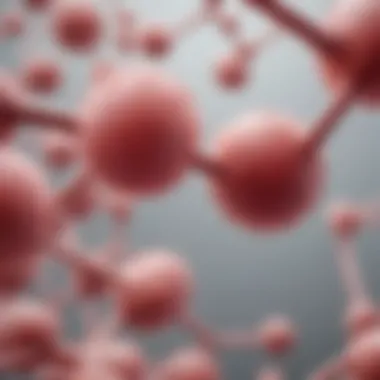Collagen's Role in Liver Health and Repair


Intro
The link between collagen and liver health has emerged as a significant area of research. Understanding this connection requires a closer look at how collagen functions within the body, particularly in relation to the liver. Collagen, a structural protein, plays a vital role in maintaining tissue integrity and facilitating healing processes. This examination focuses on the biochemical mechanisms through which collagen influences liver functions, repairs damaged tissues, and its implications for liver diseases.
Through this article, readers will gain insights into the current research surrounding collagen’s effectiveness regarding liver health. The exploration encompasses various dietary sources, possible supplementation methods, and the larger implications of liver function for overall well-being.
Research Overview
Summary of Key Findings
Research indicates that collagen may contribute to liver health by supporting tissue regeneration and acting as a structural component in liver architecture. Studies have shown that increased collagen production is associated with improved liver function, especially in conditions such as fibrosis and cirrhosis. Furthermore, liver cells, particularly hepatic stellate cells, are vital in collagen synthesis.
"Collagen serves not only as a structural support in the liver but also plays a pivotal role in healing and regeneration processes."
Methodologies Employed
Various methodologies have been utilized in studies exploring collagen and the liver. These include:
- Histological analyses to assess collagen deposition in liver tissues.
- Biochemical assays that measure collagen levels during liver injury and recovery phases.
- Clinical trials evaluating the effects of collagen supplementation on liver function parameters in patients with liver disease.
The combination of laboratory studies and clinical trials provides a comprehensive understanding of collagen's role and effectiveness in supporting liver health.
In-Depth Analysis
Detailed Examination of Results
Collagen's role in liver health cannot be overstated. The findings reveal several critical insights:
- Tissue Repair: Collagen aids in the repair of liver tissues damaged due to various factors such as alcohol abuse or viral infections. It supports wound healing and plays a vital role in forming scar tissue during liver recovery.
- Detoxification: Collagen helps maintain the liver's detoxification pathways, ensuring the organ functions properly in filtering toxins from the bloodstream.
- Regenerative Capacity: The regenerative capacity of the liver is closely linked to collagen levels. Adequate collagen promotes healthy liver tissue which facilitates regeneration.
Comparison with Previous Studies
Previous studies have shown mixed results about the effects of collagen on liver health. Earlier research primarily focused on the structural aspects of collagen in fibrosis development. Recent findings, however, demonstrate a much broader perspective, emphasizing collagen's regenerative properties and implications for liver diseases.
By integrating these insights, one can appreciate how collagen not only impacts liver architecture but also plays a crucial role in regeneration and healing.
Collagen continues to show promise in therapeutic settings, particularly in liver disease management. As research progresses, it may unveil new pathways to improve treatment strategies, further emphasizing the importance of understanding this intricate relationship.
Preface to Collagen
Collagen serves as a fundamental protein within the human body, playing a key role in various biological processes. Understanding this protein is essential, particularly when evaluating its impact on liver health. As the second most abundant protein in the body, collagen is crucial for providing structure and integrity to various tissues, including skin, bones, muscles, and importantly, organs like the liver.
What is Collagen?
Collagen is a natural protein made up of amino acids and is primarily responsible for maintaining the strength and elasticity of connective tissues. It is produced within the body by specialized cells called fibroblasts. Structurally, collagen forms fibers that contribute to the framework of various tissues. This role is vital, as collagen ensures that organs maintain their proper shape and function. It also plays a critical role in wound healing and tissue repair.
Types of Collagen
There are several types of collagen, each serving distinct roles within the body. The most abundant types include:
- Type I Collagen: Found in skin, bones, tendons, and ligaments, providing tensile strength.
- Type II Collagen: Mainly present in cartilage, important for joint health.
- Type III Collagen: Found alongside Type I collagen, it supports the structure of muscles and blood vessels.
- Type IV Collagen: Located in the basement membrane, it is essential for filtration and support.
- Type V Collagen: Found in cell surfaces, hair, and the placenta, it plays a role in regulating collagen fibril formation.
Understanding these types allows for a deeper appreciation of how collagen contributes to overall health, particularly in organ systems such as the liver.


Collagen Synthesis and Degradation
Collagen synthesis is a complex process involving several steps. It begins with the production of procollagen in cells. This procollagen is then modified and assembled into collagen fibers outside the cells. Key nutrients play a role in this process, particularly vitamin C, which is necessary for collagen cross-linking and stabilization.
On the other hand, collagen degradation is equally important. It is a natural phenomenon that allows the body to remodel tissues and replace old or damaged collagen with new fibers. Enzymes called matrix metalloproteinases facilitate this process. However, factors such as aging, poor diet, and certain health conditions can disrupt the balance between collagen synthesis and degradation, which may lead to complications, especially in organs like the liver.
Understanding the dynamics of collagen synthesis and degradation provides insights into how liver health may be influenced, especially under conditions that cause increased fibrosis or damage.
Overview of Liver Health
Understanding liver health is crucial for developing a comprehensive perspective on overall wellness. The liver plays a key role in numerous bodily functions, including detoxification, protein synthesis, and metabolism. It is often referred to as the body's biochemical powerhouse. The liver's ability to process nutrients and filter harmful substances makes it essential for maintaining homeostasis and facilitating metabolic pathways.
From digestion to nutrient storage, the liver's contributions are vast and complex. It also helps regulate blood sugar levels, producing glucose when needed, and it synthesizes crucial proteins such as albumin and clotting factors. The liver's health directly impacts various systems in the body, making it a focal point in relation to collagen and overall health.
Given that collagen is also instrumental in maintaining structural integrity across tissues, its interaction with liver health cannot be overlooked. Collagen contributes to the liver's extracellular matrix, a network that provides support and helps maintain its architecture. Understanding the liver's functions sets the stage for exploring how collagen relates to liver health and diseases.
Functional Anatomy of the Liver
The anatomy of the liver is quite intricate. It is the largest internal organ, located in the upper right quadrant of the abdomen. The liver is divided into two main lobes, which consist of smaller functional units known as lobules. Each lobule contains hepatocytes, the primary cell type responsible for executing most of the liver's functions. These cells are arranged in a way that optimizes their exposure to blood, allowing efficient nutrient processing and detoxification.
The liver also has a rich blood supply from both the hepatic artery and the portal vein. This dual blood flow is vital for liver function, ensuring that it receives oxygenated blood while also receiving nutrient-rich blood from the intestines. A network of bile ducts helps transport bile, a substance essential for fat digestion. Understanding this functional anatomy is key to recognizing how disturbances in liver health can affect its functionality.
Role of the Liver in Metabolism
Metabolism is one of the liver's primary functions. The liver metabolizes carbohydrates, fats, and proteins, playing a key role in nutrient utilization. It converts glucose to glycogen for storage and retrieves it when needed, regulating blood sugar levels effectively. The liver is also involved in lipid metabolism, breaking down fats for energy and synthesizing cholesterol and lipoproteins.
Moreover, the liver metabolizes proteins through deamination, converting excess amino acids into useful forms or excreting waste via the urea cycle. This metabolic versatility means that liver health directly impacts energy levels and nutrient availability in the body.
Common Liver Diseases
Liver diseases can seriously impair functionality and lead to various health complications. Some of the most common liver diseases include:
- Hepatitis: Inflammation of the liver, often viral in nature.
- Cirrhosis: Scarring of the liver tissue, where healthy cells are replaced with scar tissue, often due to chronic liver diseases.
- Fatty Liver Disease: Accumulation of fat in liver cells can be either alcoholic or non-alcoholic.
- Liver Cancer: Malignant tumors that can arise from liver tissue.
These ailments can hinder not only liver functionality but also compromise overall systemic health. Early recognition and intervention are crucial to preventing the progression of these diseases, making it imperative to understand their implications on liver chemistry and physiology.
“The liver is a resilient organ, capable of regenerating itself, but it is not invulnerable to damage and disease.”
The relationship between collagen and liver function becomes evident when considering these common diseases. Understanding the liver’s functional health is key to linking collagen roles in systemic recovery and restoration.
The Biochemical Role of Collagen in Liver Function
Collagen plays a pivotal role in liver functionality. This section will explore specific elements related to collagen's biochemical functions, whichhave significant implications for liver health. Understanding these aspects is essential, as they contribute to the broader context of liver repair and disease management.
Collagen and Extracellular Matrix
Collagen is a major component of the extracellular matrix (ECM), providing structural support to liver cells. The ECM provides a framework that supports tissue architecture and influences how liver cells communicate with each other. It consists of proteins and other substances that define the tissue's physical properties. The synthesis of collagen in the liver is crucial, particularly after injury. Fibroblasts, which are specialized cells in the liver, produce collagen that helps in repairing damaged tissue. Collagen fibers in the ECM help maintain liver integrity during adverse conditions.
Additionally, the balance of collagen synthesis and degradation is essential. When collagen is produced excessively, it can lead to fibrotic changes, contributing to liver diseases such as cirrhosis.
Collagen in Fibrogenesis
Fibrogenesis is the process through which fibrous connective tissue forms in response to liver injury. Collagen is at the heart of this process. When the liver is injured, various cytokines and growth factors stimulate the activation of hepatic stellate cells (HSCs). Once activated, HSCs transform into myofibroblast-like cells, which produce collagen and other components of the ECM.


The role of collagen in fibrogenesis becomes a double-edged sword. On one hand, it is essential for wound healing and tissue repair. On the other hand, excessive collagen production may lead to fibrosis, potentially resulting in a stiff and less functional liver.
Impact of Collagen on Liver Inflammation
Collagen not only serves as a structural protein but also plays a role in modulating liver inflammation. Inflammatory responses in the liver can be influenced by the presence of collagen in the ECM. During inflammatory processes, cytokines can trigger increased collagen production, leading to further fibrosis. The interplay between collagen and liver inflammation is complex.
Studies indicate that increased collagen deposition can perpetuate inflammatory signals and may worsen liver injury. Therefore, understanding the mechanisms by which collagen influences inflammation is vital for developing effective therapeutic strategies to combat liver diseases.
"Collagen's interaction with liver cells can either promote healing or exacerbate conditions leading to chronic liver disease."
Collagen's Role in Liver Repair Process
Collagen plays a pivotal role in the liver’s ability to repair itself after injury. Understanding this function is essential for grasping how liver health is maintained, especially in the context of damage caused by diseases or lifestyle factors. The liver has a remarkable capacity for regeneration, but this process relies heavily on the presence and function of collagen in the extracellular matrix.
Tissue Regeneration and Collagen
During liver injuries, such as those caused by viruses, toxins, or alcohol, the liver initiates a healing process. Collagen is crucial at this stage. It provides structural support to tissue regeneration.
- Extracellular Matrix: Collagen forms the backbone of the extracellular matrix, which is vital for scaffolding cell growth and tissue repair. This matrix helps guide new hepatocytes, the liver cells, to their original locations, ensuring that the liver regains its functional architecture.
- Fibroblast Activation: When the liver is injured, fibroblasts, which are the cells responsible for collagen production, become activated. They proliferate and produce excessive amounts of collagen, leading to an initial healing response.
However, an excessive collagen buildup can cause scarring and fibrosis, leading to complications like cirrhosis over time. Thus, while collagen is essential for initial repair, its regulation is equally important to prevent pathological outcomes.
Collagen's Influence on Hepatocyte Function
The healing process in the liver is not only about repairing structure but also restoring function. Collagen directly influences the activity of hepatocytes.
- Maintenance of Cell Function: Adequate collagen levels support hepatocyte function by providing a suitable environment for these cells to thrive. This is critical for carrying out the liver's extensive metabolic tasks.
- Cell Signaling: Collagen interacts with various cell surface receptors, stimulating pathways that promote cell survival, proliferation, and differentiation. These interactions are key to restoring normal liver function after injury.
In summary, while collagen ensures initial repair in the liver, its ongoing production and degradation must be meticulously balanced. Both the regenerative capabilities of hepatocytes and the structural integrity added by collagen are critical to the recovery and health of the liver. Understanding this balance is vital for developing therapeutic strategies for liver diseases.
Collagen in Liver Disease Management
The relationship between collagen and liver health is profound, particularly when discussing liver disease management. The liver serves various critical functions, including detoxification and synthesis of essential proteins, where collagen plays a crucial role. Understanding how collagen influences liver diseases can inform treatment strategies and improve patient outcomes. This section discusses the significance of collagen in managing liver diseases, particularly cirrhosis, which is a common liver condition characterized by scarring and impaired function.
Collagen in Cirrhosis
Cirrhosis involves extensive fibrosis, and collagen types I and III are key components of this fibrotic tissue. The excessive deposition of collagen leads to the distortion of the liver architecture, which can severely affect its functionality. The role of collagen here is not merely structural; it also plays a part in liver inflammation and the subsequent fibrotic process.
- Mechanism of Collagen Formation: The hepatic stellate cells are primarily responsible for collagen production during liver repair. In response to injury, these cells become activated and transform into myofibroblasts, initiating collagen deposition.
- Collagen Type Variability: Different types of collagen contribute various functions—Type I collagen is more prevalent in late-stage fibrosis, while Type III is often seen in early stages. Understanding this variability is essential for determining the stage of cirrhosis, which can guide treatment decisions.
- Clinical Implications: Monitoring collagen levels can provide insights into the progression of cirrhosis. Non-invasive imaging techniques and serum markers may assess collagen content, reducing the need for invasive liver biopsies. Sparked interest in the use of these assessments has made them critical in clinical settings.
Prognostic Value of Collagen Assessment
Assessing collagen levels in patients with liver disease offers valuable prognostic information. Increased collagen deposition not only signifies disease progression but also correlates with the risk of complications. Here are some key considerations:
- Predictive Value for Outcomes: High levels of collagen are linked to portal hypertension and liver-related complications. Thus, the degree of fibrosis can be a predictor for patient outcomes.
- Biomarkers in Assessment: Non-invasive markers such as the Fibrosis-4 index or elastography can be utilized to estimate collagen levels objectively. These tools have become critical in hepatology, providing a way to monitor patients without invasive procedures.
- Therapeutic Guidance: Knowledge of a patient’s collagen status can guide treatment options. For example, individuals with advanced fibrosis might require more aggressive management strategies, including planning for liver transplantation.
The assessment of collagen in liver diseases not only helps in the diagnosis but also in monitoring disease progression and predicting clinical outcomes, making it an indispensable element in liver disease management.
Dietary Sources of Collagen
The role of diet in maintaining optimal levels of collagen is crucial, especially considering how collagen impacts liver health. Collagen serves various biological functions, including structural support for tissues. Understanding dietary sources of collagen allows individuals to make informed decisions that may benefit their liver and overall well-being. This section outlines natural food sources rich in collagen and discusses collagen supplements, which have become increasingly popular.
Natural Foods Rich in Collagen


Natural foods are a primary source of collagen and the body’s own ability to synthesize it. Consuming these foods can support collagen production and liver health. Some of the most notable sources include:
- Bone Broth: Made by simmering animal bones and connective tissues, bone broth is rich in collagen, amino acids, and minerals.
- Chicken Skin: It contains a high amount of collagen, particularly type II collagen, which is beneficial for joint and tissue health.
- Fish Skin: Fish, like salmon, is another abundant source of collagen, especially for its beneficial omega-3 fatty acids, which are great for overall health.
- Egg Whites: Egg whites are not rich in collagen directly, but they contain proline, an amino acid necessary for collagen production.
- Dairy Products: They contain necessary proteins that can aid collagen synthesis, although moderation is advised due to lactose content in some individuals.
The consumption of these foods can boost collagen levels and improve liver function over time. A diet that includes these sources may also help in the prevention of liver-related diseases and promote overall systemic health.
Collagen Supplements: Types and Efficacy
Collagen supplements have captured attention for their potential health benefits. These supplements come in various forms, each with varying levels of efficacy. Here are some common types:
- Hydrolyzed Collagen: Also known as collagen peptides, these are broken down into smaller molecules for better absorption. Studies suggest that they support skin elasticity and joint health, which also relates to liver function.
- Gelatin: Derived from collagen, gelatin is often used in cooking and can assist with digestion as well as skin health.
- Collagen Tablets or Capsules: These are convenient and can integrate easily into daily routines. The efficacy often depends on the source and formulation.
Considerations for Use
When opting for collagen supplements, it is essential to consider factors such as:
- Quality of the product: Look for third-party testing to ensure quality and absence of harmful additives.
- Source of collagen: Some supplements derive collagen from bovine, marine, or porcine sources. Each source may have different benefits and should be selected according to individual health goals.
"While food sources of collagen are optimal, supplementation can provide an additional boost in collagen levels for those who may not meet their dietary needs."
Research and Future Directions
The exploration of collagen and liver health has evolved considerably in recent years. It is crucial to continue examining this relationship as it unfolds. The investigation provides insights into how collagen contributes to liver function, regeneration, and overall health. Therefore, future studies will undoubtedly impact both clinical and nutritional approaches to liver diseases. It is critical to focus on specific aspects in ongoing research.
There are systematic reviews that underscore collagen’s multifaceted role in liver health. These studies can guide clinicians in managing liver diseases more efficiently. As researchers analyze the biochemical pathways and collagen's impact, clearer therapeutic strategies can emerge. Such advancements promise to enhance patient outcomes significantly.
Collaborative research efforts between academic institutions and healthcare organizations will be vital. These partnerships can lead to innovative therapies that utilize collagen’s properties effectively. In addition, identifying specific collagen types that provide the greatest health benefits will enhance treatment options.
Current Studies on Collagen and Liver Health
Recent studies provide invaluable data about collagen’s role in liver health. Research indicates that collagen is not merely a structural protein. Rather, it plays a part in numerous signaling pathways that affect cellular behavior. For example, studies demonstrate that certain collagen types promote liver cell proliferation following injury. This regeneration is essential for recovering from various liver diseases.
The investigation into liver fibrosis has also gained attention. Studies show a correlation between excessive collagen deposition and the progression of liver fibrosis. Understanding this relationship is vital for developing antifibrotic therapies. Some researchers are examining how collagen degradation enzymes could mitigate fibrosis, presenting new avenues for treatment.
"The role of collagen in liver health highlights the need for precise research methodologies to uncover its full therapeutic potential."
Overall, current studies emphasize a comprehensive approach to understanding collagen. Researchers aim to clarify its complex interactions within the liver environment.
Challenges in Research and Implications
Despite the progress, challenges persist in the study of collagen and liver health. One significant concern includes variability in study designs. Different methodologies may lead to conflicting results, making it challenging to form consensus on best practices. Standardizing research protocols can aid in accumulating comparable data.
Another challenge lies in the identification of specific collagen types that affect liver function. The liver contains various collagen types, each with unique properties. Differentiating their roles in liver regeneration and disease progression remains complex. Further research is needed to elucidate these distinctions accurately.
The implications of this research extend beyond academia into clinical practice. As the collect scientific knowledge evolves, clinicians can adapt treatment plans based on new insights. A better understanding of collagen's role in liver health may also have effects on dietary recommendations, emphasizing collagen-rich foods or supplements as intervention strategies.
In this context, reflecting on the current frameworks and future research pathways is important. Finding clarity within the complexities of collagen research will pave the way to significant health advancements.
Ending
The conclusion serves as the final reflection on the detailed examination of the relationship between collagen and liver health presented throughout this article. A clear understanding of this connection is crucial, as it influences approaches to liver disease management and overall well-being. Collagen's biochemical roles in the liver, particularly in terms of tissue regeneration and inflammation control, offers insights into preventive and therapeutic strategies for various liver conditions.
Summary of Key Points
Throughout this article, several salient points have emerged:
- Collagen forms an essential component of the extracellular matrix, providing structural support in the liver.
- It plays a role in fibrogenesis, contributing to the liver's healing process, particularly after injury.
- Collagen influences hepatocyte function, affecting liver metabolism and regeneration.
- Emerging research links collagen levels with various liver diseases, offering prognostic value in conditions like cirrhosis.
- Dietary sources of collagen, along with supplementation, may enhance liver health and overall function.
In recognizing these elements, the importance of both respecting the traditional understanding of liver health and embracing newer research findings becomes clear.















